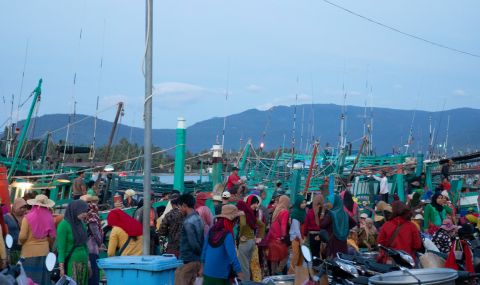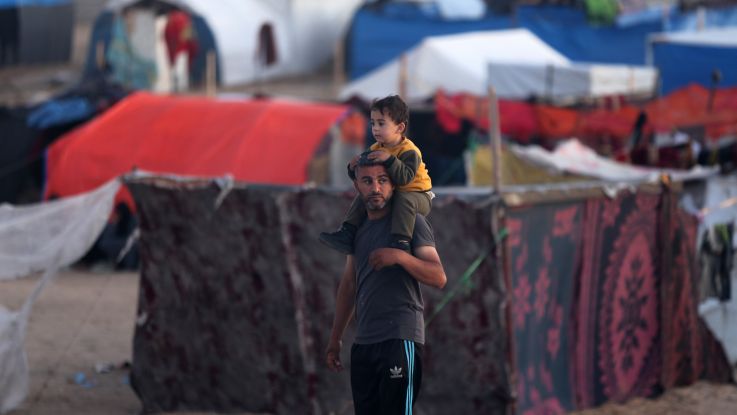How will Covid affect women and girls in poverty?
24 March 2020
The World Health Organisation declared the Covid-19 outbreak as a pandemic in early March 2020. This new coronavirus and Covid-19 disease affects all of us around the world, but women and girls living in poverty will be even more severely affected. Find out what consequences this outbreak could have for women and girls worldwide.

Residents of a village in Sierra Leona, attend a hand-washing session during the Ebola outbreak of 2014. Photo: Tommy Trenchard/ActionAid
As countries around the world come to terms with the new reality of living with the novel coronavirus and its associated disease – Covid-19, hundreds and thousands of women and girls in the global south – who are already struggling with poverty – will now be waking up to an uncertain and dangerous future.
Evidence from past disease outbreaks in the world such as Ebola and Zika reveal that women and girls often face unique risks and vulnerabilities during and after global health crises.
The dangers posed by Covid-19 are already compounding the existing inequalities and hardships faced by women and girls in the global south.
The spread of the novel coronavirus could impact women and girls' health
Continuously washing hands with warm water and soap to prevent the spread of the virus, as directed by the World Health Organisation can be difficult when you have no water or sanitation facilities.
In refugee camps where women and girls have limited access to sanitation facilities, washing hands regularly becomes even more difficult.
Living in close contact with large groups of people in the camps can also expose those vulnerable to this infectious disease, with no room to distance or isolate themselves.1
In poor countries, the absence of even basic free healthcare provision, and the limited preventive measures, mean that whole populations are at risk of contracting the virus and not getting suitable treatment when they fall sick.2
Women in the global south also play a large role in collecting food and feeding their families. The burden of sourcing food from markets and shops is primarily shouldered by women and can increase their exposure to the virus as they spend more time outside the house.
Without access to immediate and affordable health care, women and girls who often bear the burden of domestic care at home looking after the children, the elderly and the sick, could now face risks to their own health.
Women are also at the frontlines of fighting this pandemic. Globally, two thirds of health sector jobs are held by women including nursing, midwifery and community health work.3 This also places them at a higher risk of exposure to the disease.
The Covid-19 pandemic could increase the risk of sexual violence against women and girls
Many women and girls in the global south are often responsible for sourcing food for their families and finding water. They also walk long distances to collect it.
Women around the world spend a significant amount of time - nearly 200 million hours everyday - collecting water.4 They also usually travel alone to far-flung places and are at risk of sexual violence whilst in search of water.
With the outbreak of the novel coronavirus, communities will see an increase in demand for water to wash and clean themselves and their families.
Women will potentially need to travel further and further to find scarce sources of water, putting themselves at an added risk of violence.

Women buying food at a market in Kampot, Cambodia .
Women and girls are at an increased risk of domestic violence during and after the outbreak of the novel coronavirus
Women's and girls' vulnerability to gender-based violence increases in times of emergencies.
Lack of amenities, disruption to the usual supply of resources, disturbances to daily life and severed social networks create an unstable environment for women and girls during crises and put them at a risk of violence.
One of the measures to prevent contracting and spreading the novel coronavirus is for whole families to stay at home and socially distance or isolate from friends and others. But what happens to the vulnerable, who now face extended periods of time with a potentially abusive partner or family member?
Women and girls around the world not only face a heightened threat of violence during this pandemic but they may also be disconnected from their usual support networks who could provide help.
This is exacerbated by economic inequality in developing countries where women and girls are less able to leave their abusive partners or families as they tend to be financially reliant on them and have lesser access to education and other opportunities.
Lack of access to resources such as income and food in times of crises such as health pandemics, may also mean families look to child marriages as a way out of poverty .Girls who marry as children face an even higher risk of domestic violence than women who marry freely as adults.

Garment workers in the global south are at risk of losing their jobs in the pandemic.
The Covid-19 outbreak is already affecting income and working conditions
As people around the world are prioritising their health during the pandemic, demand for clothes and garments is decreasing.
As a result, garment factories in the global south including Bangladesh, Cambodia and Vietnam are facing imminent closure, and threatening the livelihoods of 40 million garment workers.5
Approximately, 80% of these workers are women6 and risk facing destitution when work dries up.
Women and girls employed in these industries already face poor working conditions and low wages, but removing their vital and sometimes only source of income could mean they face further poverty.
Those forced to work on crowded factory floors, in poor conditions with no access to sanitation and protective clothing can also risk contracting the virus from close contact with others.
Furthermore, in developing countries, more than two thirds of women work in the informal economy, without sick leave and unemployment benefits which puts their income and well-being in jeopardy.
How is ActionAid responding to the novel coronavirus pandemic?
One of ActionAid’s top priorities is to maintain support to our humanitarian and development programmes around the world.
We are monitoring the situation on a country-by-country basis and ensuring our country programmes are supported and encouraged to follow their government’s guidelines.
We're in regular contact with all our Country Directors to ensure that vulnerabilities faced by women and girls are not exacerbated during this pandemic and we are advocating for the need for gender-sensitive responses when dealing with this epidemic.
What can I do to help?
As Covid-19 spreads to Africa, South East Asia and Latin America, it is only a matter of time before the world’s most vulnerable will be facing a catastrophe of immense proportions.
Amid existing poverty and global inequality, people in the world’s poorest countries are already struggling with the consequences of several humanitarian emergencies including refugee crises, climate change and conflict.
Now they face an unprecedented global emergency.
We urgently need your help to support the most vulnerable to stop the spread and save lives.
Footnotes
- 1https://www.nytimes.com/2020/03/19/world/middleeast/syria-coronavirus-idlib-tents.html
- 2https://www.theguardian.com/global-development/2020/mar/20/worlds-most-vulnerable-in-third-wave-for-covid-19-support-warn-experts
- 3 https://apps.who.int/iris/bitstream/handle/10665/311314/WHO-HIS-HWF-Gender-WP1-2019.1-eng.pdf?sequence=1&isAllowed=y&te=1&nl=in-her%20words&emc=edit_gn_20200312
- 4https://water.org/our-impact/water-crisis/womens-crisis/
- 5 https://www.theguardian.com/global-development/2020/mar/19/garment-workers-face-destitution-as-covid-19-closes-factories
- 6https://www.icrw.org/files/publications/PACE_Report_PRINT_singles_lo.pdf



